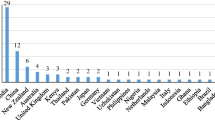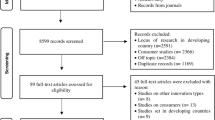Abstract
Despite there being considerable research and knowledge surrounding the risks of climate change on agricultural productivity, fewer studies have examined risks from a whole-of-chain perspective (i.e. from producer to consumer) and the perceptions of consumers about the climate adaptation strategies of food businesses. This paper presents the findings of a survey of 1532 Australian consumers and how they might respond to a food company’s climate adaptation strategy. Three respondent archetypes, ‘Eco-warriors’ (n = 557), ‘Undecideds’ (n = 600) and ‘Abdicators’ (n = 375), were identified based on their perceptions of risks associated with climate change and their attitudes towards climate adaptation. Further analysis was carried out to understand how each group of respondents would respond to adaptation strategies employed by food companies. Based on the findings of this study, two main challenges are presented for food value chains: (1) translating consumer needs and preferences to niche opportunities arising from adaptation and (2) understanding how best to communicate adaptation benefits based on varying attitudes and information needs. By addressing these challenges, synergies between adaptation goals and competitive strategies in food value chains may be achieved.



Similar content being viewed by others
Notes
In Australia, males are more likely to obtain TAFE qualifications than females (Australian Bureau of Statistics 2012).
Evidence suggests that climate change belief and denial is not as clear-cut as it seems to be (Leviston and Walker 2013; Greenhill et al. 2014) and that belief represents something that is deeper in an individual’s ideological structure. The issue of perceptions of coping in relation to belief lies in the link between perceived risk of climate change impacts and adaptive capacity (Grothmann and Patt 2005). This research addresses the issue raised by Leviston in multiple publications (Leviston and Walker 2013; Greenhill et al. 2014; Walker and Leviston 2015), in that future research should take into account more nuanced forms of climate change belief and denial by allowing for the complexity of human thinking to surface in the context of a challenging issue.
References
Australian Bureau of Statistics (2011) Census Quick Stats. http://www.censusdata.abs.gov.au/census_services/getproduct/census/2011/quickstat/0. Accessed 11 Dec 2015
Australian Bureau of Statistics (2012) Year Book Australia, 2012, Education and training. http://www.abs.gov.au/ausstats/abs@.nsf/Lookup/by%20Subject/1301.0~2012~Main%20Features~Educational%20attainment~110. Accessed 11 Dec 2015
Australian Bureau of Statistics (2012) Year Book Australia 2012, Vocational education and training (VET). http://www.abs.gov.au/ausstats/abs@.nsf/Lookup/by%20Subject/1301.0~2012~Main%20Features~Vocational%20education%20and%20training%20(VET)~106. Accessed 11 Dec 2015
Australian Bureau of Statistics (2014) Regional population growth, Australia, 2013–2014. http://www.abs.gov.au/ausstats/abs@.nsf/mf/3218.0/. Accessed 11 Dec 2015
Australian Bureau of Statistics (2015) Australian Demographic Statistics, Mar 2015. http://www.abs.gov.au/ausstats/abs@.nsf/mf/3101.0. Accessed 11 Dec 2015
Barnett J, O’Neill S (2010) Maladaptation. Glob Environ Change 20:211–213. doi:10.1016/j.gloenvcha.2009.11.004
Belz F-M, Schmidt-Riediger B (2010) Marketing strategies in the age of sustainable development: evidence from the food industry. Bus Strategy Environ 19:401–416. doi:10.1002/bse.649
Bollinger LA et al (2014) Climate adaptation of interconnected infrastructures: a framework for supporting governance. Reg Environ Change 14:919–931. doi:10.1007/s10113-013-0428-4
Bonney L, Clark R, Collins R, Fearne A (2007) From serendipity to sustainable competitive advantage: insights from Houston’s Farm and their journey of co-innovation. Supply Chain Manag Int J 12:395–399. doi:10.1108/13598540710826326
Braziotis C, Bourlakis M, Rogers H, Tannock J (2013) Supply chains and supply networks: distinctions and overlaps. Supply Chain Manag Int J 18:644–652. doi:10.1108/SCM-07-2012-0260
Carbon Disclosure Project (2012) A new era: supplier management in the low-carbon economy. Carbon Disclosure Project, London. http://www.sustainablebrands.com/digital_learning/research/new-era-supplier-management-low-carbon-economy with login details
Christopher M, Towill D (2001) An integrated model for the design of agile supply chains. Int J Phys Distrib Logist Manag 31:235–246. doi:10.1108/09600030110394914
Commonwealth of Australia (2015) Agricultural competitiveness white paper. Canberra. ISBN: 978-1-925237-74-0. http://agwhitepaper.agriculture.gov.au/SiteCollectionDocuments/ag-competitiveness-white-paper.pdf. Accessed 14 Jan 2016
Crimp S, Howden M, Stokes C, Schroeter S, Keating B (2014) Climate change challenges for low-input cropping and grazing systems—Australia. In: Climate change impact and adaptation in agricultural systems. CABI Climate Change Series No. 5. CABI, Wallingford, pp 47–68. doi:10.1079/9781780642895.0047
Ericksen PJ (2008) Conceptualizing food systems for global environmental change research. Glob Environ Change 18:234–245. doi:10.1016/j.gloenvcha.2007.09.002
Everingham YL, Muchow RC, Stone RC, Inman-Bamber NG, Singels A, Bezuidenhout CN (2002) Enhanced risk management and decision-making capability across the sugarcane industry value chain based on seasonal climate forecasts. Agric Syst 74:459–477. doi:10.1016/S0308-521X(02)00050-1
Everitt BS, Landau S, Leese M, Stahl D (2011) Cluster analysis, 5th edn. Wiley, London
Fuglie KO, Heisey PW, King JL, Pray CE, Day-Rubenstein K, Schimmelpfennig D, Wang SL, and Karmarkar-Deshmukh R (2011) Research investments and market structure in the food processing, agricultural input, and biofuel industries worldwide. ERR-130. U.S. Dept. of Agriculture, Econ. Res. Serv. December 2011. http://www.ers.usda.gov/media/199879/err130_1_.pdf. Accessed 14 Jan 2016
Greenhill M, Leviston Z, Leonard R, Walker I (2014) Assessing climate change beliefs: response effects of question wording and response alternatives. Public Underst Sci 23:947–965. doi:10.1177/0963662513480117
Gregory PJ, Ingram JS, Brklacich M (2005) Climate change and food security. Philos Trans R Soc Lond B Biol Sci 360:2139–2148. doi:10.1098/rstb.2005.1745
Grothmann T, Patt A (2005) Adaptive capacity and human cognition: the process of individual adaptation to climate change. Glob Environ Change 15:199–213. doi:10.1016/j.gloenvcha.2005.01.002
Hair JF, Black WC, Babin BJ, Anderson RE, Tatham RO (2006) Multivariate data analysis, 6th edn. Pearson Prentice Hall, Upper Saddle River
Henzell T (2007) Australian agriculture: its history and challenges. CSIRO Publishing, Collingwood
Hocherberg Y (1988) A sharper Bonferroni procedure for multiple tests of significance. Biometrika 75:800–802. doi:10.1093/biomet/75.4.800
Holt D, Watson A (2008) Exploring the dilemma of local sourcing versus international development—the case of the flower industry. Bus Strategy Environ 17:318–329. doi:10.1002/bse.623
Howden SM, Soussana JF, Tubiello FN, Chhetri N, Dunlop M, Meinke H (2007) Adapting agriculture to climate change. Proc Natl Acad Sci USA 104:19691–19696. doi:10.1073/pnas.0701890104
Janssens W, Wijnen K, De Pelsmacker P, Van Kenhove P (2008) Marketing research with SPSS. Pearson Education, Essex
Leiserowitz AA, Maibach E, Roser-Renouf C (2010) Climate change in the American mind: Americans’ global warming beliefs and attitudes in January 2010 on climate change. Yale Project on Climate Change, New Haven CT. http://e360.yale.edu/images/digest/AmericansGlobalWarmingBeliefs2010.pdf. Accessed 11 Dec 2015
Leviston Z, Walker I (2013) Beliefs and Denials About Climate Change: An Australian Perspective. Ecopsychology 4(4):277–285. doi:10.1089/eco.2012.0051
Leviston Z, Price JC, Malkin S, McCrea R (2013) Fourth annual survey of Australian attitudes to climate change: interim report. CSIRO, Perth. https://publications.csiro.au/rpr/download?pid=csiro:EP1312080&dsid=DS2. Accessed 11 Dec 2015
Lim-Camacho L et al (2015) Facing the wave of change: stakeholder perspectives on climate adaptation for Australian seafood supply chains. Reg Environ Change 15:595–606. doi:10.1007/s10113-014-0670-4
Lorenzoni I, Nicholson-Cole S, Whitmarsh L (2007) Barriers perceived to engaging with climate change among the UK public and their policy implications. Glob Environ Change 17:445–459. doi:10.1016/j.gloenvcha.2007.01.004
Lusch R, Vargo S, Tanniru M (2010) Service, value networks and learning. J Acad Mark Sci 38:19–31. doi:10.1007/s11747-008-0131-z
Macharia J, Collins R, Sun T (2013) Value-based consumer segmentation: the key to sustainable agri-food chains. Br Food J 115:1313–1328. doi:10.1108/BFJ-09-2011-0215
Normann R, Ramirez R (1993) Designing interactive strategy. Harvard Bus Rev 71:65–77. https://hbr.org/1993/07/designing-interactive-strategy. Accessed 11 Dec 2015
O’Brien KL, Leichenko RM (2000) Double exposure: assessing the impacts of climate change within the context of economic globalization. Glob Environ Change 10:221–232. doi:10.1016/S0959-3780(00)00021-2
Parfitt J, Barthel M, Macnaughton S (2010) Food waste within food supply chains: quantification and potential for change to 2050. Philos Trans R Soc B 365:3065–3081
Picketts I, Andrey J, Matthews L, Déry S, Tighe S (2015) Climate change adaptation strategies for transportation infrastructure in Prince George. Can Reg Environ Change. doi:10.1007/s10113-015-0828-8
Porter S, Reay D (2015) Addressing food supply chain and consumption inefficiencies: potential for climate change mitigation. Reg Environ Change. doi:10.1007/s10113-015-0783-4
Porter JR et al (2014) Food security and food production systems. In: Field CB et al. (eds) Climate change 2014: impacts, adaptation, and vulnerability. Part A: global and sectoral aspects. In: Contribution of working group II to the fifth assessment report of the intergovernmental panel of climate change. Cambridge University Press, Cambridge, and New York, NY, pp 485–533
Quezada G, Grozev G, Seo S, Wang C-H (2014) The challenge of adapting centralised electricity systems: peak demand and maladaptation in South East Queensland. Aust Reg Environ Change 14:463–473. doi:10.1007/s10113-013-0480-0
Reser J, Pidgeon N, Spence A, Bradley G, Glendon AI, Ellul M (2011) Public risk perceptions, understandings and responses to climate change in Australia and Great Britain. https://www.nccarf.edu.au/publications/public-risk-perceptions-second-survey. Accessed 11 Dec 2015
Roberts JA (1995) Profiling levels of socially responsible consumer behavior: a cluster analytic approach and its implications for marketing. J Mark Theory Pract 3:97–117. doi:10.2307/40469779
Rosenzweig C, Solecki W (2014) Hurricane Sandy and adaptation pathways in New York: lessons from a first-responder city. Glob Environ Change 28:395–408. doi:10.1016/j.gloenvcha.2014.05.003
Schmidhuber J, Tubiello FN (2007) Global food security under climate change. Proc Natl Acad Sci 104:19703–19708. doi:10.1073/pnas.0701976104
Sütterlin B, Brunner TA, Siegrist M (2011) Who puts the most energy into energy conservation? A segmentation of energy consumers based on energy-related behavioral characteristics. Energy Policy 39:8137–8152. doi:10.1016/j.enpol.2011.10.008
Taylor DH, Fearne A (2009) Demand management in fresh food value chains: a framework for analysis and improvement. Supply Chain Manag Int J 14:379–392. doi:10.1108/13598540910980297
Vermeulen SJ, Campbell BM, Ingram JSI (2012) Climate change and food systems. Annu Rev Environ Resour 37:195–222. doi:10.1146/annurev-environ-020411-130608
Vicente P, Reis E (2007) Segmenting households according to recycling attitudes in a Portuguese urban area. Resour Conserv Recycl 52:1–12. doi:10.1016/j.resconrec.2007.01.005
Walker I and Leviston Z (2015) Australia’s attitudes to climate change. ECOS 214: 16 Dec 2015. https://blogs.csiro.au/ecos/australias-attitudes-to-climate-change/. Accessed 20 Jan 2015
Winn M, Kirchgeorg M, Griffiths A, Linnenluecke MK, Günther E (2011) Impacts from climate change on organizations: a conceptual foundation. Bus Strategy Environ 20:157–173. doi:10.1002/bse.679
Wong J, Schuchard R (2012) Adapting to climate change: a guide for the food, beverage, and agriculture industry. BSR. http://www.bsr.org/en/our-insights/report-view/adapting-to-climate-change-a-guide-for-the-food-beverage-and-agriculture-in. Accessed 11 Dec 2015
Acknowledgments
This project received funding by the Australian Government Department of Agriculture ‘Filling the Research Gap’ Funding Program, Grant No. 1194456-215. We thank Amanda Hawes and Josephine Ung of Colmar Brunton for their data collection services, Prof. Ray Collins, Dr. Anne-Maree Dowd and Dr. Nadine Marshall for internally reviewing this article, and two anonymous reviewers for their helpful suggestions.
Author information
Authors and Affiliations
Corresponding author
Ethics declarations
Ethics approval was obtained from the CSIRO Social Science Human Research Ethics Committee (reference number 080/13). Respondents provided informed consent prior to participating in the survey.
Conflict of interest
The authors declare that they have no conflict of interest.
Electronic supplementary material
Below is the link to the electronic supplementary material.
Rights and permissions
About this article
Cite this article
Lim-Camacho, L., Ariyawardana, A., Lewis, G.K. et al. Climate adaptation of food value chains: the implications of varying consumer acceptance. Reg Environ Change 17, 93–103 (2017). https://doi.org/10.1007/s10113-016-0976-5
Received:
Accepted:
Published:
Issue Date:
DOI: https://doi.org/10.1007/s10113-016-0976-5




